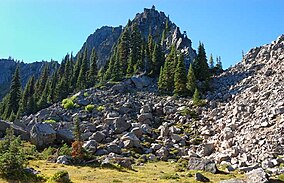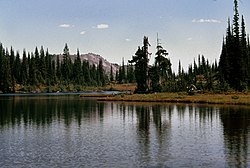Indian Heaven Wilderness is a protected area located inside the Gifford Pinchot National Forest of southwestern Washington state. The wilderness consists of 20,782 acres (8,410 ha) of broad, forested plateau, with meadows straddling numerous volcanic peaks and at least 150 small lakes, ponds, and marshes.[1] The wilderness also contains the Indian Heaven volcanic field. Originally known to the Indians as "Sahalee Tyee," the area has been and remains culturally important to Native Americans.[2] During the past 9,000 years, the Yakama, Klickitat, Cascades, Wasco, Wishram, and Umatilla tribes gathered in this area for berry picking, fishing, and hunting.[1]
| Indian Heaven Wilderness | |
|---|---|
 Lemei Rock, highest peak in Indian Heaven Wilderness | |
| Location | Skamania County, Washington, USA |
| Coordinates | 46°00′34″N 121°46′56″W / 46.00944°N 121.78222°W |
| Area | 20,782 acres (8,410 ha) |
| Established | 1984 |
| Governing body | United States Forest Service |
| Indian Heaven Wilderness | |


Landforms
editLava once flowed from the numerous volcanic cones that rise above the plateau, consisting mainly of overlapping shield volcanoes, spatter cones, and cinder cones, which averages 4,500 feet (1,400 m) in elevation.[1] The wilderness' highest point is Lemei Rock (5,927 ft), whose crater now contains Lake Wapiki.[3] Other prominent volcanic peaks include Bird Mountain, Sawtooth Mountain, Gifford Peak, East Crater, and Red Mountain. Big Lava Bed is the result of the most recent volcanic activity about 8,200 years ago.
Geology
editLemei Rock is one of the many shield volcanoes topped by cinder cones and spatter cones that make up the Indian Heaven volcanic field. About 60 eruptive centers lie on the 19-mile (30 km) long, N10°E-trending, Indian Heaven fissure zone. The 230 square miles (600 km2) field has a volume of about 20 cubic miles (100 km3) and forms the western part of a 770-square-mile (2,000 km2) Quaternary basalt field in the southern Washington Cascades, including the King Mountain fissure zone along which Mount Adams was built.
| Name | Elevation | Location | Last eruption | |
|---|---|---|---|---|
| meters | feet | Coordinates | ||
| Big Lava Bed[4] | 1,278.6 | 4,195 | 45°54′N 121°45′W / 45.9°N 121.75°W | ~8150 years ago |
| Bird Mountain[4] | 1,632 | 5,354 | 46°02′N 121°47′W / 46.03°N 121.78°W | ~8,200 years ago |
| Crazy Hills[4] | ||||
| East Crater[4] | 1,614 | 5,295 | 46°00′N 121°47′W / 46°N 121.78°W | ~8,200 years ago |
| Gifford Peak[4] | 1,614 | 5,295 | ~8,200 years ago | |
| Lemei Rock[4] | 1,806 | 5,925 | 46°1′6″N 121°45′36″W / 46.01833°N 121.76000°W | ~8,200 years ago |
| Lone Butte[4] | 1,457 | 4,780 | 46°03′N 121°52′W / 46.05°N 121.87°W | ~8,200 years ago |
| Red Mountain[4] | 1,513 | 4,964 | 45°56′N 121°49′W / 45.93°N 121.82°W | ~8,200 years ago |
| Sawtooth Mountain[4] | 1,632 | 5,354 | 46°04′N 121°47′W / 46.07°N 121.78°W | ~8,200 years ago |
Wildlife
editFauna
editDeer and elk reside in the wilderness area until winter snows drive them lower, along with black bears attracted to the abundant ripening of fall huckleberries.[3] Numerous bird species reside in the wilderness along with various small forest animals, such as chipmunks.
Flora
editThe forest conifers consist mainly of subalpine fir and Douglas fir. The area (including the Sawtooth Berry Fields) is known for its abundant huckleberries in mid-August to early September. They grow abundantly in the old, fire-scarred forest meadows burned in the past by Natives to stimulate more huckleberry production.[2]
Recreation
editThe Pacific Crest National Scenic Trail passes north/south through the wilderness, which is known for its many lakes and views of four nearby volcanoes: Mount Adams, Mount Hood, Mount St. Helens, and Mount Rainier. It is also known to hikers for an intense population of mosquitoes throughout the summer. Other major trails in the area are Indian Heaven Trail and the Cultus Creek Trail, which climbs up the east side of Bird Mountain, and Lemei Trail which traverses up the east side of Lemei Rock and passes by Lake Wapiki.[3] In late fall, the huckleberry bushes provide berries as well as intense orange color in some years.[citation needed]
In 2015, nearly 8,000 people visited the wilderness area for recreational purposes, exceeding the Forest Service's standards for solitude.[5]
References
editThis article incorporates public domain material from websites or documents of the United States Fish and Wildlife Service.
- ^ a b c "Indian Heaven Wilderness". Wilderness.net. University of Montana. Retrieved March 25, 2015.
- ^ a b "Indian Heaven Wilderness". Gifford Pinchot National Forest. U.S. Forest Service. Retrieved March 25, 2015.
- ^ a b c "Wilderness: Indian Heaven". Gifford Pinchot National Forest. U.S. Forest Service. Retrieved March 25, 2015.
- ^ a b c d e f g h i Wood, Charles A.; Jűrgen Kienle (1993). Volcanoes of North America. Cambridge University Press. pp. 166–167. ISBN 0-521-43811-X.
- ^ Thomas, Al (September 1, 2016). "Solitude at risk in Indian Heaven Wilderness". The Columbian. Vancouver, Washington. Retrieved March 21, 2018.
External links
edit- Media related to Indian Heaven Wilderness at Wikimedia Commons
- Indian Heaven Wilderness U.S. Forest Service
- Indian Heaven Wilderness Wilderness.net (The University of Montana)
